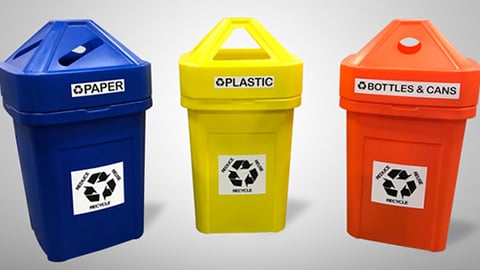CA Mandatory Recycled-Content Bill Signed Into Law
California Gov. Gavin Newsom has signed into law the United States’ first-ever recycled-content mandate for plastic beverage containers. Under the law, all plastic bottles covered by the state’s container redemption program must contain an average at least 15% postconsumer resin (PCR), starting in 2022. The recycled-content mandate rises to 25% in 2025 and 50% in 2030.
The legislation, by Assemblymembers Phil Ting, D-San Francisco, and Jacqui Irwin, D-Thousand Oaks, also makes California’s standards the strongest in the world. It aims to help develop domestic markets for recycled materials and move toward a circular economy, as well as reduce dependence on virgin plastics, which rely on oil, as part of a transition away from fossil fuels.
“California has long led the way on bold solutions in the climate space, and the steps we take today bring us closer to our ambitious goals,” said Newsom. “I thank the legislature for taking these important steps to protect the planet and public health.”
“The passage of this bill is a critical step forward,” said Steve Alexander, president and CEO of the Association of Plastic Recyclers (APR), a Washington, D.C.-based international trade association representing the plastics recycling industry that was the first plastics-related organization to publicly support such a measure, back in 2006. “Mandated PCR content creates market demand, which in turn monetizes the entire waste and recycling management system.”
Beverage manufacturers that fail to meet the targets will be subject to penalty fees of 20 cents for each pound of PCR by which they fall short. The money will go into a Recycling Enhancement Penalty Account, from which it will be spent on recycling, infrastructure, collection and processing of plastic beverage bottles.
“This is clearly a step in the right direction, but this is only the first step,” added Alexander. “We need to look at more minimum PCR requirements for all plastic packaging. APR looks forward to working with consumer brand companies to meet the requirements of this bill, as well as their sustainability goals.”
The APR backed the California legislation with technical support, on-the-ground lobbying, industry data collection and a letter encouraging Newsom to sign the bill.
When contacted by Progressive Grocer for comment, the American Beverage Association (ABA) replied in a statement: "We thank Gov. Newsom for signing this important measure into law that provides California with additional tools to help increase the production of recycled PET that can be used to make new bottles. We also thank Assemblymembers Ting and Irwin for their leadership on a measure that buttresses our shared goal of improving recycling in California, which is why we are designing our bottles to be 100% recyclable and are working to increase the amount of recycled content we use in our packaging."
The Washington, D.C.-based trade association added: “We encourage Californians to keep recycling their beverage containers, and we will continue to work with recycling advocates, RPET manufacturers and lawmakers on building a comprehensive closed-loop recycling system in California that uses more recycled content and helps ensure our bottles don’t wind up in places they shouldn’t.”
ABA's response to the new law is in line with the stance of most other stakeholders, according to a published report.
“Some industry groups opposed the bill when it was first introduced two years ago, helping kill it then,” noted the Mercury News, in San Jose, California. “But with an increasing number of companies committed to making recycled bottles as scientists report more and more alarming facts about plastic pollution in the oceans, and European nations imposing similar rules, their opposition has largely melted away.”






